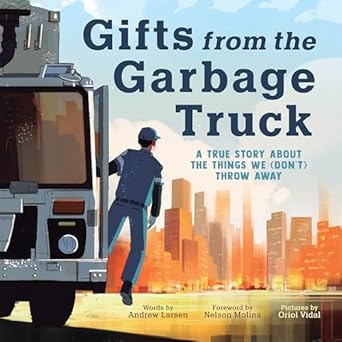Gifts From the Garbage Truck: A True Story About the Things We (Don’t) Throw Away
- context: Array
- icon:
- icon_position: before
- theme_hook_original: google_books_biblio

Gifts From the Garbage Truck: A True Story About the Things We (Don’t) Throw Away
Nelson Molina collected things.
He collected all kinds of things.
Like the scraps of wood he found on his way to school.
Nelson’s mom showed him how to use the scraps of wood to make birdhouses.
“If someone can use it, don’t throw it away,” she liked to say.
She was an expert at reusing and recycling.
The phrase "One man's trash is another man's treasure" completely captures the contents of Gifts From the Garbage Truck which is based on the life of Nelson Molina who was born and raised in New York City in East Harlem in a neighborhood called El Barrio, Spanish for the Neighborhood. In an opening “Dear Reader” page, Molina explains, “Gifts From the Garbage Truck is the story of how I created ‘Treasures in the Trash’, an amazing museum of forty-five thousand items that I found in the garbage of El Barrio. I cleaned, repaired, and arranged the objects over my thirty-four years as a New York sanitation worker.”
The childhood lesson that Molina learned from his mother [See excerpt], he put into practice in his early years by providing his siblings with toys and other items he found in the garbage and rehabilitated. As an adult, he became one of the city’s sanitation workers, and his garbage truck serviced his childhood neighborhood. Curiosity about what was in some of the black garbage bags led to Molina’s opening some and retrieving items that he thought “someone might love”. These items, Molina brought back to the sanitation garage where he displayed them so that others might enjoy them. While one of Molina’s bosses wanted his expanding collection to be taken down, others persuaded the boss to change his mind, saying, “If more people saw this, maybe they’d think twice about the things they throw away.” And so, what was initially an effort by one city employee to reduce the amount of “garbage” that would have ended up in a landfill has been transformed into a museum, and “people from all around the world come to see it.” Larsen’s brief text is fully supported by Vidal’s illustrations that were created using digital art tools.
On the book’s penultimate page, Larsen briefly addresses “The 4 RS: Reduce, Reuse, Recycle, and Rethink” as well as “Upcycling”. “Don’t Throw That Away!” offers a number of suggestions, such as “Turn a rain boot into a flowerpot.” The final page, titled “Treasures in the Trash”, contains 11 coloured photos that feature Molina, a New York City garbage truck, and six photos from inside the museum. It is unfortunate that the shots of the museum “treasures” are not larger so that readers could better see the individual items.
Dave Jenkinson, CM’s editor, lives (and follows the 4 RS) in Winnipeg, Manitoba.
